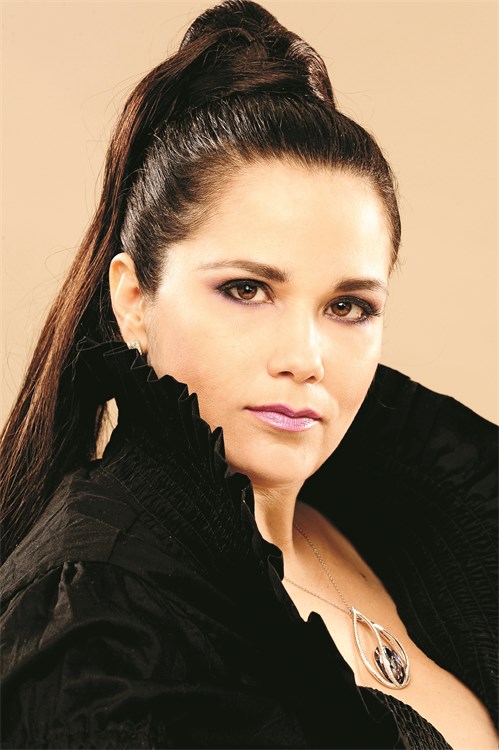MLO brings back Italian opera with an inspired “Traviata”
It has been 22 months since any pillar of the Italian operatic repertoire has been performed in Miami. (The last such production was Florida Grand Opera’s Madama Butterfly in January, 2020.)
On Saturday night, Miami Lyric Opera took a big step toward remedying that lyric drought with a semi-concert presentation of Verdi’s La Traviata. A nearly full house at the South Miami-Dade Cultural Arts Center in Cutler Bay greeted the company’s one-night return enthusiastically.
Billed as a concert version, the performance was considerably more. The small orchestra and chorus were onstage but the principal singers enacted their roles, none reading from a score. The men wore formal attire while the female singers were dressed in colorful costumes. This arrangement worked remarkably well, giving a fine semblance of the drama in Verdi’s setting of La Dame aus camelias by Alexander Dumas père.
The Cuban-born soprano Eglise Gutierrez in the role of the Parisian courtesan Violetta Valery was the evening’s major attraction. Gutierrez has had an international career, singing leading lyric-coloratura roles in major opera houses in Berlin, Hamburg, Dresden, Rome and London. In recent seasons, her performance schedule has been considerably less robust.
Still, any questions of her vocal state was quickly answered. From Violetta’s first utterance “Flora, amici,” Gutierrez’s control, vibrant middle register and clear top were strongly in evidence. It took time for her performance, however, to fully take off. In the first act and a half, her singing was too generalized and bland. The coloratura of “Sempre libra” was spun with accuracy but the aria and initial party scene were delivered at a low temperature.
Halfway through the Act II confrontation with Giorgio Germont, father of her lover Alfredo, Gutierrez’s performance caught fire. With Nelson Martinez superbly portraying the elder Germont, Gutierrez unleashed a plethora of emotional turmoil. At first stern and unyielding, then showing reticence and resignation, she encompassed Violetta’s sacrifice in fervent tones. Gutierrez began “Dite alia giovane” almost in a whisper before rising to match Martinez in volume and power.
As she bade the unwitting Alfredo farewell, her outburst of “Amami, Alfredo” throbbed with intensity. Wearing a stunning dark sequined gown for Flora Bervoix’s party in Act III, she projected anguish at seeing Alfredo and the impending confrontation with her escort Baron Douphol. Gutierrez held nothing back for Violetta’s death scene. She read Germont’s apologetic letter barely audibly, as if hardly able to speak, and gathered vocal strength for “Addio del passato,” rendered like a cry of desperation. Her final moments were riveting, capped by a blazing top note and fall to the ground as the final chords sounded.
Martinez’s big, plush Verdi baritone brought visceral excitement from the moment he entered. Initially cold and stern, stiffly walking with a cane, he articulated the text with dramatic penetration. His compassion for Violetta’s ultimate decision strongly registered. “Di provenza il mar” was sung with grand Verdian line and total security in the lower register. In a time when this role is too frequently sung by lighter baritone voices, it was a pleasure to hear Martinez’s rounded sonority fill the house. (Martinez has sung Germont at the Metropolitan Opera.)
Martin Nusspaumer was an ardent Alfredo. His voice had vigor and strength but he scaled it down for a melting “Parigi, o cara” with Gutierrez. His denunciation at Flora’s party of Violetta’s perceived faithlessness resounded with steely impact. Nusspaumer and Gutierrez’s voices blended winningly in duet.
The supporting roles were capably filled. Elizabeth DiFronzo’s firm mezzo and strong dramatic instincts illuminated Flora into a larger presence. Gabriel Menendez was a stentorian, angry Douphol, clearly ready to challenge Alfredo at cards or for his life. Gibson Dorce’ brought compassion and a firm bass to Dr. Grenvils’ grave utterances. Ismael Gonzalez was a distinctive Marchese d’Obigny with the low voice to match and Jared Poroune filled Gastone’s lines with a light, clean tenor compass. Samantha Rilling-Lopez was the sweet voiced Annina, Violetta’s maid.
While choral singing has sometimes been a debit at MLO productions, that was not the case this time out. The choruses of gypsys and matadors were finely balanced and robustly sung .(Five of the women rhythmically struck tambourines which was doubly welcome since the orchestra lacked percussion.) With Gutierrez forcefully riding over orchestra and chorus, the concluding Act II ensemble had tremendous impact.
Here and throughout the evening, Leo Walz chose sensible tempos and gave strong impetus to the moments of high drama. There were the usual wind and brass mishaps but generally Walz kept the orchestra in order and the preludes to Acts I and IV were nicely assayed by the 13 strings. The only questionable musical decision was ending Act II with Germont’s aria instead of the angry words between Alfredo and his father that follow in Verdi’s score.
As is often the case, this MLO production was more than the sum of its individual parts. For much of the evening, Raffaele Cardone’s company delivered red0blooded Verdi and it was definitely good to experience that in Miami once again.
Miami Lyric Opera presents Donizetti’s L’Elisir d’Amore February 19 and 20, 2022 at the South Miami-Dade Cultural Arts Center in Cutler Bay. miamilyricopera.org
Posted in Performances
One Response to “MLO brings back Italian opera with an inspired “Traviata””
Leave a Comment
Sun Nov 7, 2021
at 1:36 pm
1 Comment


Posted Nov 11, 2021 at 2:11 pm by Miriam Codias
Thank you for your comments about our chorus. We work hard!
Thanks again!